Museums of the Far East
The Museums of the Far East (French: Musées d'Extrême-Orient, Dutch: Musea van het Verre Oosten) is a complex of three museums in Laeken, City of Brussels (Belgium), dedicated to Oriental art and culture, specifically that of China and Japan. It is part of the Royal Museums of Art and History (RMAH).
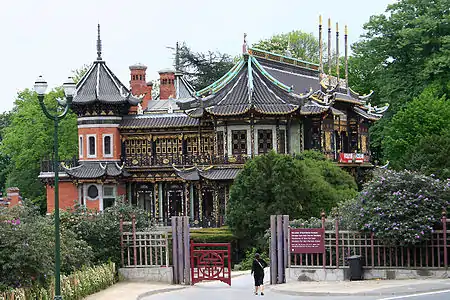 The Chinese pavilion of the museum, housing the collection of porcelain and ceramics | |
 Location within Brussels | |
| Location | Avenue Van Praet / Van Praetlaan 44, B-1020 Laeken, City of Brussels, Brussels-Capital Region |
|---|---|
| Coordinates | 50.8939°N 4.3601°E |
| Owner | Royal Museums of Art and History |
| Website | Official website |
The three museums have been closed since 2013 because of structural weaknesses.[1] Some items from their collections are on public display at the Art & History Museum.
History
The idea for an outdoor display of oriental buildings, open to the public on the site, originated with King Leopold II, who had been particularly impressed by the "Tour du Monde" panorama at the Paris World Exhibition of 1900.[2] The French architect Alexandre Marcel was commissioned in 1901 to build a Japanese pagoda (known as a Tō). It was inaugurated in 1905.[2] The Pagoda stands nearly 50 metres (160 ft) tall, across the road from the rest of the museum buildings.[3]
Work on a larger Chinese Pavilion began in 1905. The building was originally intended to be a restaurant, but never served the purpose for which it was intended. In 1909, with the death of Leopold II, the original plan for a museum was abandoned and the building was donated to the Belgian state where it served as part of the Trade Museum of the Ministry of Foreign Affairs.[2] From 1947 until 1989, the whole area was closed to visitors.[2] The museums' section on Japanese art is housed in a building near the Chinese pavilion, originally intended to serve as a stable and garage for the complex.
The Museum complex is situated near to the Royal Palace of Laeken, the official residence of the King of the Belgians. The Chinese and Japanese pavilions were recognised as protected monuments in 2019.[4]
Exhibits
The Museums of the Far East collectively refers to three separate museums situated close to each other which can be accessed on the same ticket. They are:
- The Chinese Pavilion
- The Japanese Tower
- The Museum of Japanese Art
One of the principal focuses of the museums' collection, Chinese porcelain and other chinoiserie, is housed in the Chinese pavilion. The Pavilion's displays focus on Chinese art originally designed for export to the West.[5][6] The Chinese Pavilion is situated in a Chinese garden.
The Japanese Tower displays Japanese art, mostly porcelain created for export to the West. It is situated within a replica Japanese garden. The Museum of Japanese Art contains the bulk of the museums' collection of Japanese art and displays several suits of samurai armour, netsuke and decorative sword hilts, as well as woodblock prints and other artifacts. It is situated in the complex's carriage house and has only recently opened to the public.[7]
Temporary exhibitions are also regularly held at the museum.[8] Further examples of Asian art are also held by the RMAH at the Cinquantenaire Museum in Brussels.
Gallery
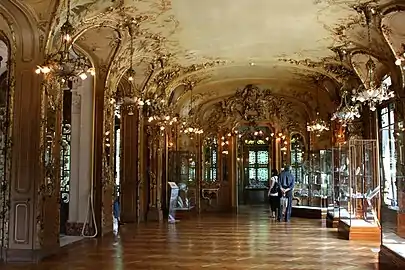 View of one of the principal rooms of the Chinese Pavilion
View of one of the principal rooms of the Chinese Pavilion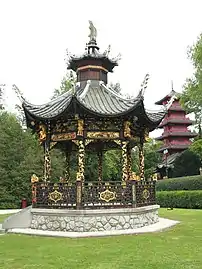 Chinese kiosk
Chinese kiosk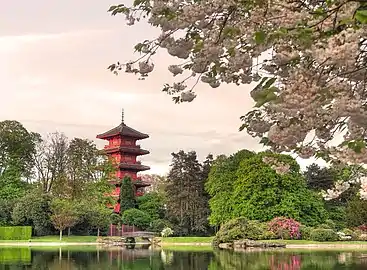 View of the Japanese tower from the Japanese Garden
View of the Japanese tower from the Japanese Garden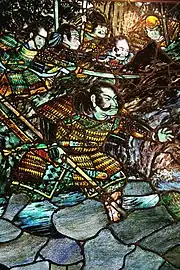 Japanese-inspired stained-glass window, depicting a Samurai in the Japanese tower
Japanese-inspired stained-glass window, depicting a Samurai in the Japanese tower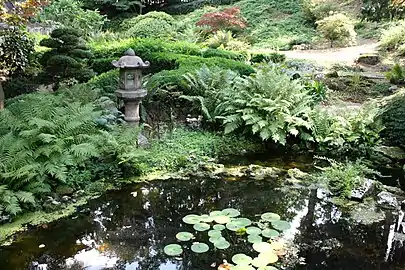 Part of the Japanese Garden near the Pagoda
Part of the Japanese Garden near the Pagoda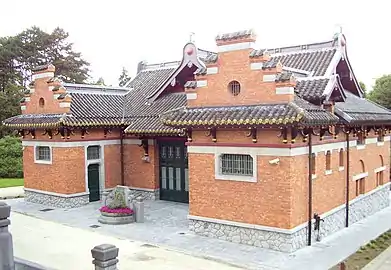 Out-building housing the collection of Japanese art, inaugurated in 2006
Out-building housing the collection of Japanese art, inaugurated in 2006
References
- "25-10-2013 | KMKG". Kmkg-mrah.be. 25 October 2013. Retrieved 2 June 2014.
- "Official History". kmkg-mrah.be. Retrieved 2 April 2013.
- Clericuzio, Peter. "The Shifting Meanings and Uses of the Japanese Tower at Laeken". Retrieved 2 April 2013. Cite journal requires
|journal=(help) - "Japanse Toren en Chinees Paviljoen beschermd als erfgoed". bruzz.be (in Dutch). Bruzz. Belga. 12 December 2019. Retrieved 13 December 2019.
- "La porcelaine chinoise d'exportation". Kmkg-mrah.be. Retrieved 3 April 2013.
- "Museums of the Far East". Brusselsmuseums.be. Archived from the original on 4 March 2016. Retrieved 3 April 2013.
- "Collections". Kmkg-mrah.be. Retrieved 3 April 2013.
- "Exposition Passée: Les douze heures des maisons vertes et autres beautés". Kmkg-mrah.be. Retrieved 3 April 2013.
External links
| Wikimedia Commons has media related to Museums of the Far East. |
- Museums of the Far East at the Official Website of the Brussels Region